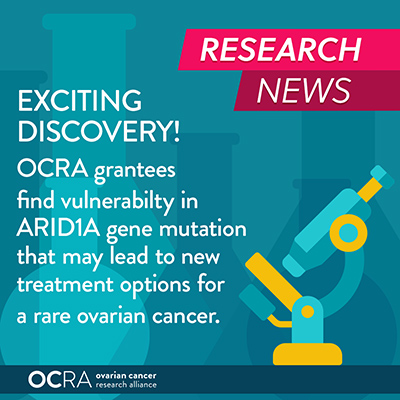
OCRA grantees Dr. Rugang Zhang and Dr. Shuai Wu, both of The Wistar Institute, along with colleagues, have discovered a vulnerability in cancer cells that harbor certain genetic mutations. Their findings, which involve the ARID1A gene, point to potential new pathways of treatment for patients living with ovarian clear cell carcinoma (OCCC).
What is an ARID1A mutation?
ARID1A is a gene that suppresses tumor growth by binding to DNA and preventing cells from dividing too much. When certain mutations occur in this tumor suppressor gene, it becomes inactivated, meaning it no longer functions to keep cell growth in check. And this uncontrolled cell proliferation, in turn, can lead to the formation of tumors.
These ARID1A mutations are known genetic drivers of ovarian clear cell carcinoma, existing in up to 60% of this ovarian cancer subtype, which is characterized by its low response rate to chemotherapy and its poor prognosis when diagnosed at advanced stages.
ARID1A mutations and glutamine
With such limited treatment options for OCCC currently available, Dr. Zhang and team examined how ARID1A-mutant cancer cells could be targeted therapeutically. The researchers found promise in the cells’ metabolic dependency on the amino acid known as glutamine, which is typically required for cancer cells to grow. The team discovered that these ARID1A-mutant cancer cells had been reprogrammed or transformed in such a way that they heavily depended on glutamine for the metabolic functions that enable cell growth and survival.
“Metabolic reprogramming is a hallmark of many cancers, including OCCC, so in this study we assessed whether ARID1A plays a role in regulation of metabolism,” Dr. Zhang said. “We found that its inactivation in cancer cells creates a specific metabolic requirement for glutamine and exposed this as a vulnerability that could be exploited for therapeutic purposes.”
Can blocking glutamine metabolism help fight ovarian cancer?
The researchers evaluated whether using an inhibitor drug to block an enzyme that’s crucial to the glutamine metabolic process has therapeutic potential in treating ovarian clear cell carcinoma. When the CB-839 inhibitor was tested in vivo on OCCC mouse models, it significantly reduced tumor burden and prolonged survival. The efficacy of the drug was also studied in mice carrying patient-derived tumor transplants. These tests showed that the CB-839 inhibitor impaired the growth of ARID1A-mutant tumors but not tumors in which the ARID1A genes were wildtype or not mutated.
Another therapeutic approach that showed promise in studies was the combination of CB-839 with immune checkpoint inhibitor anticancer drugs to suppress the growth of ARID1A-mutant OCCC tumors.
“Our findings suggest that glutaminase inhibitors warrant further studies as a standalone or combinatorial therapeutic intervention for OCCC, for which effective options are very limited,” said Dr. Wu.
Learn more about their findings via the OCRA-funded study by The Wistar Institute published online in Nature Cancer.
Rugang Zhang, PhD
The Wistar Institute
2008, 2019 OCRA Grantee
“Developing Epigenetic Therapies for Ovarian Cancer”



